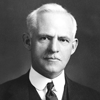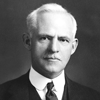Frederick H. Goff
National Intellectual Treasure
During the first few decades of the 20th century, Frederick Harris Goff (see video) was one of Cleveland’s most prominent and beloved citizens. He was also a national intellectual treasure but, sadly, his name is not well known among most 21st-century Americans or even among Clevelanders. This lack of recognition is unfortunate because Goff, like his better-known contemporaries Andrew Carnegie and John D. Rockefeller, changed philanthropy forever, here and around the world. As the American philosopher William James has stated, “The great use of a life is to spend it for something that outlives it.” As more and more citizens across the globe adopt and adapt Goff’s concept of pooling their charitable assets to create a permanent vehicle for addressing pressing local needs, his humanitarian legacy burns ever brighter. For this reason Goff’s life and career merit reconsideration. The high points of his biography are presented below. Also see scholar Eleanor Woodward Sacks’s appraisal of Goff’s place on the national scene.
 Frederick Harris Goff, humanitarian, 1858‒1923
Frederick Harris Goff, humanitarian, 1858‒1923 Frances Southworth, Goff’s bride and intellectual partner
Frances Southworth, Goff’s bride and intellectual partner A burning desire to be an attorney animated Goff as a young man.
A burning desire to be an attorney animated Goff as a young man. In Memoriam
“I knew him only to honor and most highly respect him.” Industrialist and philanthropist John D. Rockefeller
“He was the one man in whom all classes of people had absolute faith.” Cleveland mayor Frederick Kohler
“The whole people of Cleveland were, in a sense, his family—he loved us all and worked for us all with unselfish devotion.” Former Cleveland mayor Newton D. Baker
Goff at a Glance
Born: December 15, 1858, to Frederick C. and Catherine Brown Goff
Birthplace: Blackbury, Illinois
Married: October 16, 1894, to Frances Southworth
Children: Frederika, William S. and Frances M.
Died: March 14, 1923, of complications from surgery for bowel cancer
Buried: Lake View Cemetery, Cleveland
Chronology
1863 or ’64 Moved to Cleveland with his parents
1881 Graduated from the University of Michigan and obtained employment in Cleveland as a law librarian while studying evenings for admission to the Cuyahoga County (Ohio) bar
1883 Admitted to the bar and started a solo practice
1884 Entered the first of a series of law partnerships, resulting in Goff’s specializing in business reorganizations and other financial challenges
1896 Joined forces with a corporate law firm headed by Virgil Kline, which counted among its clients John D. Rockefeller’s Standard Oil Company of Ohio
1896 Constructed a home for his bride of two years at 9900 Lake Shore Boulevard in the village of Glenville
1903 Accepted a draft by Glenville citizens eager to rid the village of a horse racing track popular with gamblers and, once elected mayor, passed anti-gambling legislation that forced the tracks’ backers (among whom numbered several friends) to relocate
1907 Represented the Cleveland Electric Railway Company in negotiations with Mayor Tom L. Johnson that put an end to the city’s notorious “streetcar wars”
1908 Resigned from Kline, Carr, Tolles & Goff—a predecessor of Cleveland-based Jones Day, a powerhouse law firm with 2,400 attorneys on five continents—to accept an appointment as president of the Cleveland Trust Company bank
1914 Convinced the Cleveland Trust board to adopt a Resolution and Declaration of Trust creating the Cleveland Foundation
1923 Built Cleveland Trust into the country’s sixth largest bank by the time of his death
Goff’s Other Banking Innovations
- Instituted an independent daily audit
- Introduced a service called a “living trust” for persons who desired, while still alive, to implement inheritance plans for their families
- Encouraged Cleveland Trust to offer reasonable mortgage terms, easing the path to home ownership for the working classes, especially those of African-American descent
- Prohibited loans to officers and directors, prompting one member of the Cleveland Trust board to proclaim, “Fred, you can’t do that. What do you think we are directors for?”
Fun Facts
- Goff came to Cleveland in a boxcar he shared with a horse, a prized family possession his parents asked him and his older brother to guard on the journey east from their native Illinois. He was no more than five or six years old.
- At the age of 10 or 12, Goff joined the crew of a sailing vessel and circumnavigated the Great Lakes.
- In his first month as an attorney, he earned fees totaling $2.40—about $50 today.
- Goff made an offer to John D. Rockefeller, his law firm’s client, to take on the restructuring of Standard Oil to meet federal antitrust regulations. The proposed negotiation was rejected by President Theodore Roosevelt, whose administration subsequently entered into litigation that forcibly broke up the conglomerate.

